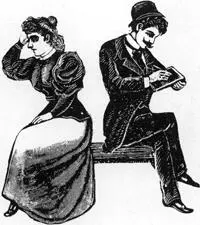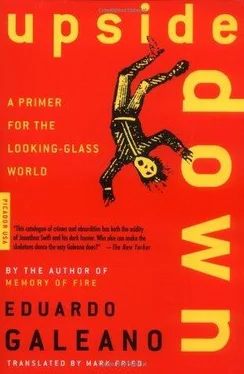Take the case of the car, which advertising portrays as a blessing within everyone’s reach. A universal right? An achievement of democracy? If that were true and every human being could become the happy owner of one of these four-wheeled good-luck charms, the planet would face sudden death by asphyxiation. Even before that, it would run out of fuel and grind to a halt. The world has already burned up, in a brief span, most of the oil formed in the earth over millions of years. Cars built one after another, at the rate of a beating heart, devour half the oil the world produces every year.

Its owners treat the planet as if it could be discarded, a commodity to be used up, the way images flitting across a TV screen or the fashions and idols launched by advertising fade away shortly after they are born. But what other world are we going to move to? Are we all obliged to swallow the line that God sold the planet to a few companies because in a foul mood he decided to privatize the universe? Consumer society is a booby trap. Those at the controls feign ignorance, but anybody with eyes in his head can see that the great majority of people necessarily must consume not much, very little, or nothing at all in order to save the bit of nature we have left. Social injustice is not an error to be corrected, nor is it a defect to be overcome; it is an essential requirement of the system. No natural world is capable of supporting a mall the size of the planet.
The leaders who promise to take the countries of the South into the First World by an act of magic that will turn us all into prosperous subjects of the kingdom of waste ought to be tried for fraud and as accessories to a crime. For fraud because they promise the impossible; if we all consumed like those who are squeezing the earth dry, we’d have no world left. And as accessories to a crime because the lifestyle they promote — the huge orgasm of delirious consumption they call happiness — sickens our bodies, poisons our souls, and leaves us without the home the world wished to become long before it existed.



CRASH COURSE ON INCOMMUNICATIONS

War is the continuation of television by other means. So General Karl von Clausewitz might say if he were to come back to life after a century and a half and start channel surfing. Real reality imitates virtual reality, which imitates real reality in a world that sweats violence from every pore. Violence begets violence, as we all know, but it also begets profits for the industry that turns violence into merchandise, then sells it as spectacle.
The ends no longer need to justify the means. Today the means, the means of mass communication, justify the ends of a system of power that imposes its values on the entire planet. A handful of giant corporations are in charge of the world’s Ministry of Education. Never have so many been held incommunicado by so few.
IS THE RIGHT OF FREE EXPRESSION THE RIGHT TO LISTEN?
In the sixteenth century, several theologians of the Catholic Church justified the Conquest of America in the name of communication. Jus communicationis: the conquistadors spoke, the Indians listened. War turned out to be both inevitable and just, since the Indians pretended to be deaf. Their right to communicate was the right to obey. At the end of the twentieth century, that rape of America is still called an “encounter,” and we still use the term “communication” for the monologues of the powerful.
Tell Me Your Secrets/1
Malaysia recently revamped its communications network. A Japanese company was to do the work, but at the last minute the U.S. giant AT&T suddenly undercut its offer and snatched the deal away. AT&T won the contract thanks to the good offices of the NSA, the National Security Agency, which tracked down and deciphered the Japanese bid.
The NSA, a U.S. spy agency with a budget four times that of the CIA, has the technology to record every word transmitted by telephone, fax, or e-mail in any part of the world. It can intercept up to two million conversations per minute. The NSA’s real mission is to maintain U.S. economic and political control over the planet, but national security and the struggle against terrorism are its formal covers. Its eavesdropping systems allow it to track every message that has anything to do with criminal organizations as dangerous as, for example, Greenpeace or Amnesty International.
All these facts came out in March 1998 when the European Parliament published an official report entitled, “Evaluation of the Technologies of Political Control.”
Tell Me Your Secrets/2
How does a modern company communicate with its real customers? By means of virtual customers, programmed by computer.
The British supermarket chain Sainsbury has worked up a mathematical model to simulate the movements and sentiments of its shoppers. The computer screen shows the virtual customer walking down the aisles amid shopping carts, revealing his or her tastes and fears, family commitments and personal needs, social position and ambitions. It can also measure the impact of advertising and discounts, the influence of store hours on the flow of customers, and the importance of the location of merchandise.
That’s how they study buying behavior and that’s how they design sales strategies: virtual media to multiply real profits.
Around the world spins a ring of satellites filled with millions and millions of words and images that come from the earth and are returned to it. Marvelous gadgets the size of your fingernail receive, process, and transmit at the speed of light messages that half a century ago would have required thirty tons of machinery. Miracles of technoscience in these technotimes: the most fortunate members of our media-mad society can now enjoy their vacations at the beach picking up the cell phone, receiving e-mail, checking the beeper, reading faxes, responding to messages on the answering machine by leaving messages on other answering machines, shopping by computer, and spending their free time playing video games or watching tiny portable TVs. In its awesome rise and dizzying flight, communications technology displays almighty powers. At midnight the computer kisses the forehead of Bill Gates, and at dawn he wakes up as the richest man in the world. Now on the market is a computer with a built-in microphone so you can talk to it. In cyberspace’s Celestial City, the computer marries the telephone and the television, and all of humanity is invited to the baptism of their astonishing children.
The emerging cybercommunity takes refuge in virtual reality, while real communities are transformed into an immense desert filled with people, each of whom lights a candle to his own saint, each of whom is encased in his own bubble. Forty years ago, according to polls, six out of ten North Americans trusted most people. But the trust index is down: today it’s only four out of ten. This sort of progress just promotes separation. The more relations between people get demonized — they’ll give you AIDS, or take away your job, or ransack your house — the more relations with machines get sacralized. The communications industry, that most dynamic sector of the world economy, sells abracadabras that open the doors to a new era in human history. But this so-well-communicated world looks too much like a kingdom of loners and the mute.
Читать дальше
















